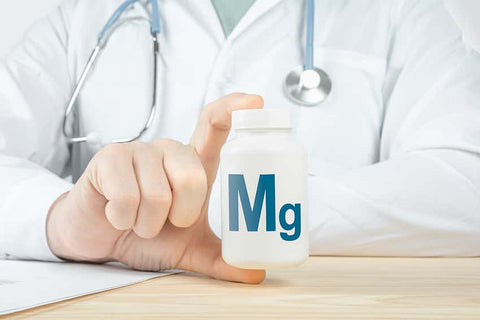Magnesium is an essential mineral found naturally in many foods and your body. However, as with most supplements and nutrients, there are risks associated with taking in too much.
A magnesium overdose can lead to a condition known as hypermagnesemia, which occurs when there is too much magnesium in your blood.
So, how easy is it to overdose on magnesium? What are the benefits of this mineral when taken appropriately? And how best should you take it to benefit from its full effects?
Find out all you need to know in this article!
What is Magnesium?
Magnesium serves many functions in the body, including protein synthesis, bone formation, blood pressure regulation, energy production, and muscle function.
Many of us can manage to get an adequate intake of magnesium through diet alone, however, deficiency is still quite common, so supplementation is often necessary.
Supplementation of magnesium has been shown to possibly:
- Strengthen bones and protect against osteoporosis
- Help with depression and anxiety
- Lower blood pressure
- Alleviate headaches and migraines
- Improve sleep
The Recommended Intake of Magnesium
The recommended daily intake of magnesium for healthy adult men is 400-420mg and 310-320mg for healthy adult women. A healthy adult should aim to take around 350mg of magnesium per day in supplement form.
Too much magnesium from food does not appear to pose any health risks, so ensure you are topping up your dietary magnesium before opting for a supplement. Some of the best sources include:
- Almonds
- Cashews
- Peanuts and peanut butter
- Spinach
- Bread
- Soy milk
- Black beans
It’s important to stick to the recommended dose of magnesium otherwise you may put yourself at risk of hypermagnesemia, where the kidneys are working in overdrive to get rid of excess magnesium, though this condition is rare and more often seen in those with existing kidney problems.
Magnesium Side Effects
If you find you have taken too much magnesium, you may experience some side effects, such as:
- Diarrhea
- Nausea and vomiting
- Lethargy
- Muscle weakness
- Low blood pressure
- Urine retention
- Respiratory distress
Though the risk of ever experiencing a magnesium overdose is extremely low for the healthy person, it is possible to take in too much.
It’s important to stick to the recommended daily intake of magnesium, carefully following the instructions on your supplement.
The Best Time to Take Magnesium
Magnesium supplements can be taken at any time during the day, provided you take them consistently to reap the benefits.
For some, taking them first thing in the morning is beneficial, for others, with their evening meal or before bed.
Depending on what you may be taking magnesium for, it may be more beneficial to take it shortly before bedtime, if you are seeking a natural sleep aid.
Learn more about “Best Time to Take Magnesium” here!
The Bottom Line
Magnesium is one of the most essential nutrients for multiple bodily functions and overall health. While it is a safe supplement to take when following the dosage guidelines, you may be at risk of overdosing or experiencing side effects if you take high doses.
Avoid taking high doses and stick to the recommended intake of 350mg per day to avoid any potential side effects or risk of overdose.
Looking for a natural sleep aid containing magnesium? Performance Lab Sleep has got you covered, containing a combination of magnesium, melatonin, and L-tryptophan to help relax muscles and enhance nightly cell renewal for revitalized next-day performance!















